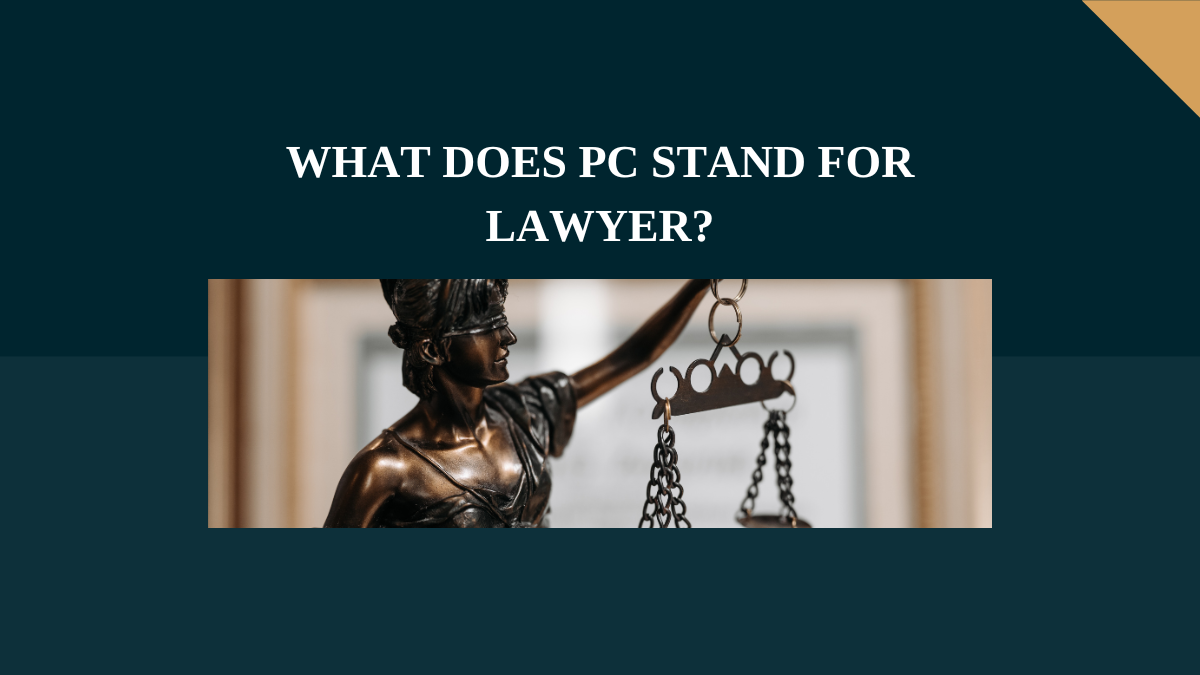What Does PC Stand For Lawyer?
Are you familiar with the term “PC” in the legal world (PC Stand For Lawyer). No, we’re not talking about personal computers or politically correct discussions. PC stands for a unique and fascinating role that plays a crucial part in the legal system – Professional Conduct.
In this blog post, we will delve into what it means to be a PC lawyer, uncovering their vital responsibilities and shedding light on the often misunderstood acronym. Join us as we explore this intriguing aspect of the legal profession and discover how PC lawyers help maintain ethics and integrity within our justice system.
What is the PC Stand for?
The PC stand for “private client,” which is a law term that refers to work done for individuals or businesses who are not government entities. Private clients typically pay more than the government does, and their cases typically receive more attention from attorneys.
Definition of PC
PC stands for “personal computer”. A personal computer is a device that allows users to access information and applications. PCs can be desktop, laptop, tablet, or phone-based.
What are the benefits of using a PC?
PC stands for “personal computer.” A PC is a versatile tool that can be used for many different tasks, such as editing documents, doing online research, and communicating with people. PCs have many benefits that make them an important part of any office or home.
They are fast and reliable, making them ideal for working on large projects or dealing with numerous emails. PCs also allow you to connect to the internet easily, which allows you to access a wide variety of information and resources.

Advantages of using a PC in the Legal Field
Using a PC (Personal Computer) in the legal field offers numerous advantages, enhancing efficiency, productivity, and the overall practice of law. Here are some key benefits:
- Legal Research: PCs provide access to vast legal databases, online libraries, and research tools, enabling lawyers to conduct comprehensive legal research quickly and efficiently. This access to information aids in building strong cases and staying updated with legal developments.
- Document Management: PCs facilitate the creation, editing, and organization of legal documents, contracts, pleadings, and briefs. Document management software streamlines collaboration among legal teams, making it easier to track changes and version history.
- Case Management: Specialized case management software on PCs allows lawyers to manage case files, deadlines, and appointments more effectively. It helps organize client information, track billable hours, and improve overall practice management.
- Communication: PCs enable lawyers to communicate with clients, colleagues, and other parties via emails, video conferencing, and messaging apps. This enhances real-time communication, regardless of geographical locations.
- E-Filing: PCs facilitate electronic filing (e-filing) of legal documents, reducing paperwork and improving efficiency in court submissions, saving time and resources.
- Collaboration: PCs enable seamless collaboration among legal teams, allowing attorneys to share information, documents, and insights in real-time, leading to more effective teamwork.
- Legal Software: PCs support the use of specialized legal software tailored to various legal tasks, such as contract drafting, e-discovery, legal analytics, and case presentation, further enhancing the quality and efficiency of legal services.
- Digital Courtrooms: Some courts have embraced digital technologies, allowing lawyers to present evidence, exhibits, and arguments using PCs, increasing efficiency and reducing the need for physical paperwork.
- Remote Work: PCs enable lawyers to work remotely, providing flexibility in managing work-life balance and ensuring continuity in case management even when away from the office.
- Cost-Effectiveness: While there may be an initial investment in hardware and software, PCs offer cost-effective solutions for legal research, document management, and communication when compared to traditional paper-based processes.
Disadvantages of using a PC
Using a PC in the legal field offers numerous advantages, but there are also some potential disadvantages to consider:
- Security Concerns: Legal professionals handle sensitive and confidential client information, making them susceptible to data breaches and cyberattacks. If proper security measures are not in place, there is a risk of unauthorized access to sensitive legal documents and client data.
- Software Compatibility: Legal professionals often rely on specific software for case management, research, and document preparation. Ensuring software compatibility with different PC operating systems can be challenging, leading to potential compatibility issues or additional costs for specialized software.
- Technical Glitches: PCs can encounter technical problems, such as crashes, hardware failures, or software glitches, which may disrupt workflow and cause delays during critical legal tasks.
- Learning Curve: Some legal professionals, especially those from older generations, may face a learning curve when adapting to new technology and software, leading to reduced productivity or resistance to change.
- Dependency on Internet: While the internet provides access to a vast array of legal resources and databases, reliance on an internet connection can be a disadvantage when connectivity issues or slow internet speeds occur.
- Distractions: PCs can be a source of distractions, with the temptation of browsing non-work-related websites or engaging in social media, potentially leading to reduced focus and productivity during work hours.
- Cost: Acquiring and maintaining PCs, along with necessary software and security measures, can represent a significant financial investment, particularly for smaller law firms or individual practitioners.
Despite these potential disadvantages, the legal field’s increasing reliance on technology, including PCs, remains essential for streamlining processes, conducting legal research, and improving overall efficiency in legal practice. It is crucial for legal professionals to address these challenges proactively through proper security protocols, regular software updates, and ongoing training to fully leverage the benefits of using PCs in the legal industry.
Implications of PC in the Field of Law
In order to fully understand the implications of PC in the field of law, it is essential to first understand what PC stands for. PC refers to the principle that all individuals have a right to be treated fairly and with respect, regardless of their background or identity. This principle is enshrined in many international human rights treaties, and is critical in ensuring that everyone has an equal opportunity to access justice.
The application of PC has implications for both lawyers and non-lawyers alike. For lawyers, it means that they must take into account the unique experiences and perspectives of their clients when representing them in court. For non-lawyers, it means that they can rely on lawyers to advocate on their behalf without fear of discrimination or harassment.
PC also has important implications for the way courts operate. By guaranteeing equal treatment for all parties involved in a legal dispute, PC ensures that everyone has an opportunity to have their case heard fairly and effectively. This is particularly important in cases where one party may have more power or resources than the other, which could lead to unfair results.
Conclusion
The term “PC” typically stands for “professional communications.” It is most commonly used to describe the electronic tools and technology lawyers use in their work. PC includes a wide range of software applications, such as word processors, spreadsheets, presentation programs, email clients, and more.






